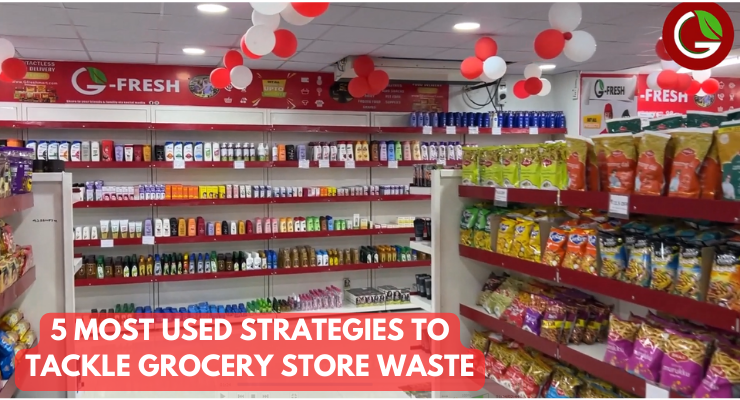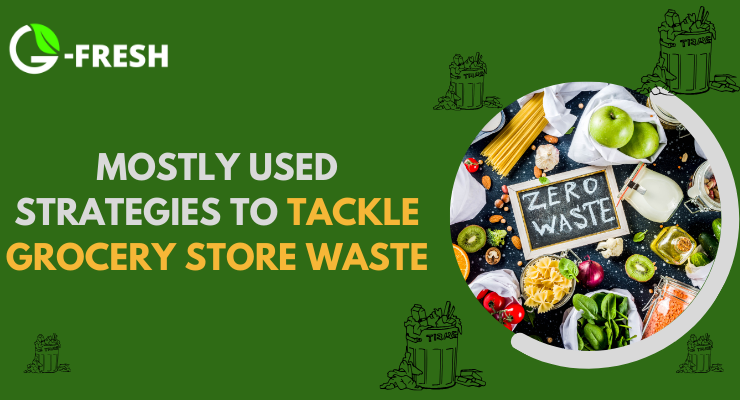5 Mostly used strategies to tackle with grocery store wastage?
Mostly Used Strategies To Tackle With Grocery Store Wastage
Are you a grocery owner and find it difficult to manage store waste? Are you looking for help managing store waste? If yes, then you are at the right place. Here, you will learn about some strategies to manage store waste. These strategies will not only help you tackle grocery storage waste but also help you save your products from being wasted.
However, store waste is considered one of the biggest problems all over the world, as it not only impacts a store’s profit rate but also damages natural and human resources. Additionally, grocery waste damages ecosystems, effects global warming, and pollutes the environment. For example, store waste usually goes to rivers and landfills, which harms the environment and ecosystem. And that’s why it is essential to manage store waste. So, to help retailers, we have curated a list of strategies for store waste. Let’s started:
Before heading up to the strategies, let’s first discuss what grocery storage waste is and why we should minimize it.
What Is Grocery Store Wastage?
Well, grocery wastage is nothing but a grocery item that is intended for human consumption but, due to some reasons, is not consumed by people. There are so many reasons for grocery waste, such as items that are expired, no longer in demand, high prices, and so on.
Why Is It Essential To Reduce Grocery Store Waste?
Are you tired of seeing perfectly good food go to waste at your local grocery store? You’re not alone. Food waste is a significant problem globally, but there are actionable strategies that both consumers and grocery stores can implement to tackle this issue head-on.
The problem of food waste is increasing day by day, especially grocery waste. And that’s why it is crucial to reduce grocery waste. It is not the sole responsibility of grocery store owners to prevent food from being wasted; it is also the responsibility of customers to prevent grocery items from being wasted.
There are so many reasons why it is essential to reduce grocery store waste, and here we have mentioned some of the common reasons:
- Grocery waste harms the environment very badly, as most of the waste goes to landfills and rivers.
- Wasting food means diminishing natural and human resources.
- Grocery waste impacts the profit rate and reputation of supermarkets as well.
The list of reasons doesn’t end here, as there are many other reasons. Now let’s discuss some of the best strategies to tackle grocery store waste below:
How to Tackle Grocery Store Wastage?

Mostly used strategies to tackle grocery store waste:
Undoubtedly, food waste is the major issue. Although most of the waste is created by consumers, it is crucial to know that 20% of the waste is created by supermarkets. The best ways to solve this problem include prevention, donating, discounting, disposing, and composting. Let’s discuss some of the common strategies to manage grocery store waste:
Implementing Dynamic Pricing:
One innovative approach to reducing food waste is implementing dynamic pricing. This involves adjusting the prices of perishable items based on their freshness and expiration dates. By lowering prices as items approach their expiration dates, grocery stores can incentivize customers to purchase these items before they spoil. This strategy not only reduces waste but also benefits consumers by offering discounted prices.
Donating Surplus Food:
Many grocery stores have started partnering with local food banks or charities to donate surplus food instead of letting it go to waste. By establishing these partnerships, grocery stores can ensure that excess perishable items, such as fruits, vegetables, and baked goods, are redistributed to those in need rather than ending up in the trash. Not only does this practice minimize waste, but it also helps address food insecurity in the community.
Implementing Smaller Batch Orders:
Another effective strategy is for grocery stores to implement smaller batch orders from suppliers. By ordering smaller quantities of perishable items more frequently, stores can better match supply with demand, reducing the likelihood of overstocking and subsequent waste. This approach requires closer collaboration between stores and suppliers to optimize inventory management and minimize excess inventory.
Educating Consumers:
Educating consumers about food waste and providing them with practical tips to reduce waste at home can also make a significant difference. Grocery stores can use signage, informational materials, and online resources to raise awareness about the importance of reducing food waste and share strategies for storing, repurposing, and using leftovers effectively. By empowering consumers to make informed decisions, grocery stores can contribute to a culture of waste reduction.
Implementing Waste Tracking Systems:
Lastly, implementing waste tracking systems can help grocery stores identify patterns of waste and target areas for improvement. By monitoring and analyzing data on discarded items, stores can gain insights into which products are most commonly wasted and why. This information can inform inventory management strategies, purchasing decisions, and product placement within the store, ultimately reducing overall waste.
Optimized Inventory Management:
At the heart of any successful grocery store operation lies effective inventory management. By leveraging technology such as inventory tracking software and data analytics, stores can gain insights into consumer preferences, purchasing patterns, and seasonal demands.
Armed with this knowledge, retailers can optimize their ordering processes, ensuring that shelves are stocked with the right quantity and variety of products. Additionally, implementing just-in-time inventory systems can minimize excess inventory buildup and reduce the likelihood of perishable items reaching their expiration dates before being sold.
Dynamic Pricing and Promotions:
Harnessing the power of dynamic pricing and promotions can help mitigate waste by incentivizing consumers to purchase items near their expiration dates. By offering discounts or special promotions on products nearing their sell-by dates, grocery stores can stimulate demand and expedite the sale of perishable goods.
Moreover, dynamic pricing algorithms can adjust prices in real-time based on factors such as demand, time of day, and shelf life, maximizing revenue while minimizing waste. By striking the right balance between profitability and waste reduction, retailers can create a win-win situation for both their bottom line and the environment.
Collaboration With Food Banks And Non-Profit Organizations:
In the fight against food waste, collaboration is key. Many grocery stores have forged partnerships with food banks, non-profit organizations, and local charities to redistribute surplus food to those in need. Through donation programs and food rescue initiatives, retailers can divert edible but unsellable products away from landfills and towards individuals and families facing food insecurity.
By aligning their efforts with community organizations, grocery stores can make a meaningful impact on hunger relief efforts while simultaneously reducing their environmental footprint.
Educational Campaigns and Consumer Engagement:
Empowering consumers with knowledge and awareness is essential to curbing grocery store waste. Through educational campaigns, signage, and digital platforms, retailers can educate shoppers about the importance of minimizing food waste and provide practical tips for reducing waste at home.
By highlighting the environmental, social, and economic consequences of food waste, stores can inspire shoppers to make more conscious purchasing decisions and adopt sustainable consumption practices. Additionally, engaging consumers through loyalty programs, rewards incentives, and interactive experiences can foster a sense of responsibility and accountability towards reducing waste.
Investment in Sustainable Packaging and Processing Technologies:
Packaging plays a significant role in preserving the freshness and shelf life of perishable goods, but it also contributes to environmental waste. By investing in sustainable packaging solutions such as compostable materials, recyclable packaging, and eco-friendly alternatives, grocery stores can minimize their ecological footprint and appeal to environmentally-conscious consumers.
Furthermore, advancements in food processing technologies such as cold chain logistics, vacuum sealing, and modified atmosphere packaging can extend the shelf life of perishable products, reducing the likelihood of spoilage and waste.
Donation:
Grocery stores can also partner with food rescue organizations to redistribute surplus food to those in need. Instead of letting perfectly edible food go to waste, stores can donate it to shelters, food banks, or community organizations. Not only does this reduce waste, but it also helps address food insecurity in local communities, fostering a more sustainable and compassionate food system.
Educating both staff and customers about the importance of reducing food waste can have a profound impact. Training employees to properly handle and store perishable items, as well as educating them on the consequences of waste, can lead to more conscientious practices within the store. Similarly, providing customers with tips on meal planning, storage techniques, and creative ways to use leftover ingredients can empower them to minimize waste at home.
Wrapping Up
In conclusion, Mostly Used Strategies To Tackle With Grocery Store Wastage is a common and serious issue that requires effective solutions and strong action. By following strategies such as optimized inventory management, dynamic pricing and promotions, collaboration with food banks, educational campaigns, and investment in sustainable technologies, retailers can make significant strides towards minimizing waste and building a more sustainable food system. Ultimately, by working together towards a common goal of reducing food waste, we can create a brighter, more sustainable future for generations to come.
Hopefully these strategies for grocery store waste will help you reduce waste!
Also Read : Supermarket Franchise Near Me: An Comprehensive Guide
